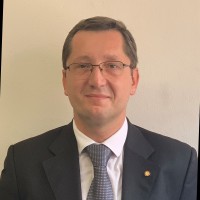GRSS President 2017-2018


Adriano Camps joined the Dept. of Signal Theory and Communications, Universitat Politècnica de Catalunya (UPC), as an Assistant Professor in 1993, Associate Professor in 1997, and Full Professor since 2007. In 1999, he was on sabbatical leave at the Microwave Remote Sensing Lab., of the Univ. of Massachusetts, Amherst. Since September 2022 he has been an ASPIRE Visiting International Professor at the UAE University, Al Ain, Abu Dhabi.
His research interests are focused on: 1) microwave remote sensing, with special emphasis on microwave radiometry by aperture synthesis (Ph.D. Thesis about the MIRAS instrument, which became the single payload of ESA’s SMOS mission), 2) remote sensing using signals of opportunity (GNSS-R), 3) radio frequency interference detection and mitigation, 4) ionospheric propagation, and 5) nanosatellites as a tool to test innovative remote sensors.
His publication record includes over 268 papers in peer-reviewed journals, 9 book chapters, and the book Emery and Camps, “Introduction to Satellite Remote Sensing. Atmosphere, Ocean, Land and Cryosphere Applications,” Elsevier, 2017, 860 pages), and more than 541 conference presentations. According to Google Scholar/Scopus, his h-index is 63/48, and his publications have received more than 15.665/10.817 citations. According to the October 2023 Stanford ranking, he is among the top 2% of researchers in all categories.
Prof. Camps holds 12 patents and has advised 30 Ph. D. Thesis students (+ 10 ongoing), and more than 150 B.Eng. final degree and M.Eng. Theses. These Ph.D. students have now responsibility positions at Universities, companies, and research centers, including NASA/JPL, ESA, and Airbus… and two have started their own companies with Prof. Camps’ participation, having transferred a total of five patents to these.
Prof. Camps was the Scientific Coordinator of the CommSensLab Research Center (María de Maeztu Excellence Research Unit 2016-2020) at the Dept of Signal Theory and Communications, UPC. Within CommSensLab, he co-led the Remote Sensing Lab (prs.upc.edu/ ), and leads the UPC NanoSat Lab (nanosatlab.upc.edu/en ). He is the PI of the first four UPC nano-satellites: 1) 3Cat-1: 1U CubeSat with 7 tech demos, 2) 3Cat-2, a 6U CubeSat an innovative dual-frequency dual-polarization GNSS-R payload, 3) 3Cat-4, a 1U Cubesat with an SDR implementing a microwave radiometer, a GNSS-Reflectomer, and AIS receiver, 4) FSSCAT, a tandem mission formed by two 6U CubeSats (3Cat-5/A and /B), and 5) the IEEE/GRSS Open PocketQube Kit (PoCat-1, -2, -3). FFSCAT was the winner of the 2017 Copernicus Masters Competition, and it is the first mission contributing to the Copernicus System based on CubeSats. FSSCAT was produced for the first time using CubeSats, scientific quality soil moisture, sea ice extent, concentration and thickness, and sea salinity maps in the Arctic].
Prof. Camps was Chair of uCal 2001, Technical Program Committee (TPC) Co-chair of IGARSS 2007, co-chair of GNSS-R ’10, general co-chair of IGARSS 2020, co-chair of the 6th Fractionated and Federated Satellite Systems Workshop, member of the organizing committee of the ESA 4th Symposium on Space Educational Activities (SSEA), and has participated in all TPCs of the International Geoscience and Remote Sensing Symposium (IGARSS) since 2000, and in the TPCs of other conferences such as MicroRad, M2GARSS, Congreso de la AET, Asamblea Nacional de la URSI (Spain) etc.
Prof. Camps was Associate Editor of Radio Science, IEEE Geoscience and Remote Sensing Letters, and IEEE Transactions on Geoscience and Remote Sensing, and has been guest editor of several special issues in IEEE and MDPI. He was the President-Founder of the IEEE Geoscience and Remote Sensing Society (GRSS) Chapter in Spain, he is the Counselor of the IEEE Student Branch at UPC-BarcelonaTech, and in 2017-2018 he was the President of the IEEE Geoscience and Remote Sensing Society.
Prof. Camps has received several awards for his contributions to:
- Research: 1) 2nd National Award of University Studies (1993); 2) INDRA award of the COIT to the best PhD in Remote Sensing (1997); 3) UPC extraordinary Ph.D. Award (1999); 4) Research Distinction of the Generalitat de Catalunya (2002); 5) the European Young Investigator Award (2004), 6) the ICREA Academia award (2009, 2015), and 7) the elevation to the grade of Fellow of the IEEE (2011).
- Technology transfer: As a member of the Microwave Radiometry Group, he received 1) the 1st Duran Farell Award (2000) 2) the Ciutat de Barcelona award (2001) for Technology Transfer, and 3) the “Salvà i Campillo” Award of the COETC for the most innovative research project for MIRAS/SMOS activities (2004), and 4) the 7th Duran Farell award for Technological Research for the work on GNSS-R instrumentation and applications (2010), 5) the 13th Duran Farell award for Technological Research for the work on the FSSCAT mission (2022), the 6) with Dr. Querol, the ESNC Award-Barcelona Challenge for the FENIX system to detect and mitigate RFI in GNSS receivers (2015), and 7) the 2017 ESA Sentinel Small Satellite Challenge and the Overall Winner of 2017 Copernicus Masters Competition.
- Education: collective awards together with Profs. R. Bragós, E. Alarcón, E. Sayrol, A. Oliveras, and J. Pegueroles: 1) Jaume Vicens Vives award 2012 (17/9/2012) from the Generalitat de Catalunya for the Project “Concepció, Disseny, Implementació i Operació de l’itinerari d’assignatures de projectes d’acord amb la iniciativa International CDIO” at Telecom Barcelona, and 2) UPC award to the Teaching Quality at the University 2012 from the Social Council of the Universitat Politècnica de Catalunya, and individual award: 3) IEEE Geoscience and Remote Sensing Society – Education Award 2021
(Date: Jan., 2024)























